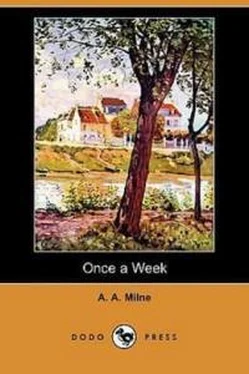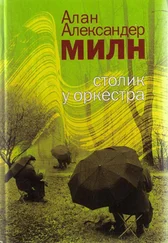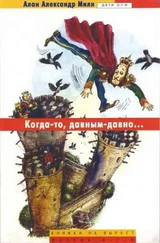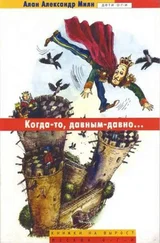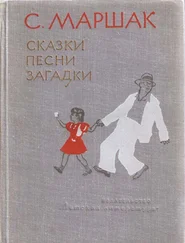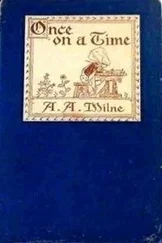Алан Милн - Once a Week
Здесь есть возможность читать онлайн «Алан Милн - Once a Week» весь текст электронной книги совершенно бесплатно (целиком полную версию без сокращений). В некоторых случаях можно слушать аудио, скачать через торрент в формате fb2 и присутствует краткое содержание. Год выпуска: 2014, Издательство: epubBooks Classics, Жанр: Юмористическая проза, на английском языке. Описание произведения, (предисловие) а так же отзывы посетителей доступны на портале библиотеки ЛибКат.
- Название:Once a Week
- Автор:
- Издательство:epubBooks Classics
- Жанр:
- Год:2014
- ISBN:нет данных
- Рейтинг книги:5 / 5. Голосов: 1
-
Избранное:Добавить в избранное
- Отзывы:
-
Ваша оценка:
- 100
- 1
- 2
- 3
- 4
- 5
Once a Week: краткое содержание, описание и аннотация
Предлагаем к чтению аннотацию, описание, краткое содержание или предисловие (зависит от того, что написал сам автор книги «Once a Week»). Если вы не нашли необходимую информацию о книге — напишите в комментариях, мы постараемся отыскать её.
Once a Week — читать онлайн бесплатно полную книгу (весь текст) целиком
Ниже представлен текст книги, разбитый по страницам. Система сохранения места последней прочитанной страницы, позволяет с удобством читать онлайн бесплатно книгу «Once a Week», без необходимости каждый раз заново искать на чём Вы остановились. Поставьте закладку, и сможете в любой момент перейти на страницу, на которой закончили чтение.
Интервал:
Закладка:
"Anything," said Jeremy grandly. "Shall I swim the Channel? I was practising my new trudgeon stroke in the bath this morning." He got up from his chair and prepared to give an exhibition of it.
"No, nothing like that." Mrs. Jeremy hesitated, looked anxiously at him, and then went boldly at it. "I want you to go in for that physical culture that everyone's talking about."
"Who's everyone? Cook hasn't said a word to me on the subject; neither has Baby; neither has―"
"Mrs. Hodgkin was talking to me about it yesterday. She was saying how thin you were looking."
"The scandal that goes on in these villages," sighed Jeremy. "And the Vicar's wife too. Dear, all this is weeks and weeks old; I suppose it has only just reached the Vicarage. Do let us be up–to–date. Physical culture has been quite démodé since last Thursday."
"Well, I never saw anything in the paper"―
"Knowing what wives are, I hid it from you. Let us now, my dear wife, talk of something else."
"Jeremy! Not for my birthday present?" said his wife in a reproachful voice. "The Vicar does them every morning," she added casually.
"Poor beggar! But it's what Vicars are for." Jeremy chuckled to himself. "I should love to see him," he said. "I suppose it's private, though. Perhaps if I said 'Press'―"
"You are thin, you know."
"My dear, the proper way to get fat is not to take violent exercise, but to lie in a hammock all day and drink milk. Besides, do you want a fat husband? Does Baby want a fat father? You wouldn't like, at your next garden party, to have everybody asking you in a whisper, 'Who is the enormously stout gentleman?' If Nature made me thin—or, to be more accurate, slender and of a pleasing litheness—let us believe that she knew best."
"It isn't only thinness; these exercises keep you young and well and active in mind."
"Like the Vicar?"
"He's only just begun," said his wife hastily.
"Let's wait a bit and watch him," suggested Jeremy. "If his sermons really get better, then I'll think about it seriously. I make you a present of his baldness; I shan't ask for any improvement there."
Mrs. Jeremy went over to her husband and patted the top of his head.
"'In a very devoted mood this morning,'" she quoted.
Jeremy looked unhappy.
"What pains me most about this," he said, "is the revelation of your shortcomings as a wife. You ought to think me the picture of manly beauty. Baby does. She thinks that, next to the postman, I am one of the―"
"So you are, dear."
"Well, why not leave it? Really, I can't waste my time fattening refined gold and stoutening the lily. I am a busy man. I walk up and down the pergola, I keep a dog, I paint little water–colours, I am treasurer of the cricket club; my life is full of activities."
"This only takes a quarter of an hour before your bath, Jeremy."
"I am shaving then; I should cut myself and get all the soap in my eyes. It would be most dangerous. When you were a widow, and Baby and the pony were orphans, you and Mrs. Hodgkin would be sorry. But it would be too late. The Vicar, tearing himself away from Position 5 to conduct the funeral service―"
"Jeremy, don't !"
"Ah, woman, now I move you. You are beginning to see what you were in danger of doing. Death I laugh at; but a fat death—the death of a stout man who has swallowed the shaving–brush through taking too deep a breath before beginning Exercise 3, that is more than I can bear."
"Jeremy!"
"When I said I wanted to kill someone for you, I didn't think you would suggest myself, least of all that you wanted me fattened up like a Christmas turkey first. To go down to posterity as the large–bodied gentleman who inhaled the badger's hair; to be billed in the London press in the words, 'Curious Fatal Accident to Adipose Treasurer'—to do this simply by way of celebrating your twenty–sixth birthday, when we actually have a bottle of Apollinaris left in the Apollinaris bin—darling, you cannot have been thinking―"
His wife patted his head again gently. "Oh, Jeremy, you hopeless person," she sighed. "Give me a new sunshade. I want one badly."
"No," said Jeremy, "Baby shall give you that. For myself I am still feeling that I should like to kill somebody for you. Lloyd George? No. F. E. Smith? N–no…." He rubbed his head thoughtfully. "Who invented those exercises?" he asked suddenly.
"A German, I think."
"Then," said Jeremy, buttoning up his coat, "I shall go and kill him ."
One of Our Sufferers
There is no question before the country of more importance than that of National Health. In my own small way I have made something of a study of it, and when a Royal Commission begins its enquiries, I shall put before it the evidence which I have accumulated. I shall lay particular stress upon the health of Thomson.
"You'll beat me to–day," he said, as he swung his club stiffly on the first tee; "I shan't be able to hit a ball."
"You should have some lessons," I suggested.
Thomson gave a snort of indignation.
"It's not that ," he said. "But I've been very seedy lately, and―"
"That's all right; I shan't mind. I haven't played a thoroughly well man for a month, now."
"You know, I think my liver―"
I held up my hand.
"Not before my caddie, please," I said severely; "he is quite a child."
Thomson said no more for the moment, but hit his ball hard and straight along the ground.
"It's perfectly absurd," he said with a shrug; "I shan't be able to give you a game at all. Well, if you don't mind playing a sick man―"
"Not if you don't mind being one," I replied, and drove a ball which also went along the ground, but not so far as my opponent's. "There! I'm about the only man in England who can do that when he's quite well."
The ball was sitting up nicely for my second shot, and I managed to put it on the green. Thomson's, fifty yards farther on, was reclining in the worst part of a bunker which he had forgotten about.
"Well, really," he said, "there's an example of luck for you. Your ball―"
"I didn't do it on purpose," I pleaded. "Don't be angry with me."
He made two attempts to get out, and then picked his ball up. We walked in silence to the second tee.
"This time," I said, "I shall hit the sphere properly," and with a terrific swing I stroked it gently into a gorse bush. I looked at the thing in disgust and then felt my pulse. Apparently I was still quite well. Thomson, forgetting about his liver, drove a beauty. We met on the green.
"Five," I said.
"Only five?" asked Thomson suspiciously.
"Six," I said, holing a very long putt.
Thomson's health had a relapse. He took four short putts and was down in seven.
"It's really rather absurd," he said, in a conversational way, as we went to the next tee, "that putting should be so ridiculously important. Take that hole, for instance. I get on the green in a perfect three; you fluff your drive completely and get on in—what was it?"
"Five," I said again.
"Er—five. And yet you win the hole. It is rather absurd, isn't it?"
"I've often thought so," I admitted readily. "That is to say, when I've taken four putts. I'm two up."
On the third tee Thomson's health became positively alarming. He missed the ball altogether.
"It's ridiculous to try to play," he said, with a forced laugh. "I can't see the ball at all."
"It's still there," I assured him.
He struck at it again and it hurried off into a ditch.
"Look here," he said, "wouldn't you rather play the pro.? This is not much of a match for you."
I considered. Of course, a game with the pro. would be much pleasanter than a game with Thomson, but ought I to leave him in his present serious condition of health? His illness was approaching its critical stage, and it was my duty to pull him through if I could.
Читать дальшеИнтервал:
Закладка:
Похожие книги на «Once a Week»
Представляем Вашему вниманию похожие книги на «Once a Week» списком для выбора. Мы отобрали схожую по названию и смыслу литературу в надежде предоставить читателям больше вариантов отыскать новые, интересные, ещё непрочитанные произведения.
Обсуждение, отзывы о книге «Once a Week» и просто собственные мнения читателей. Оставьте ваши комментарии, напишите, что Вы думаете о произведении, его смысле или главных героях. Укажите что конкретно понравилось, а что нет, и почему Вы так считаете.
